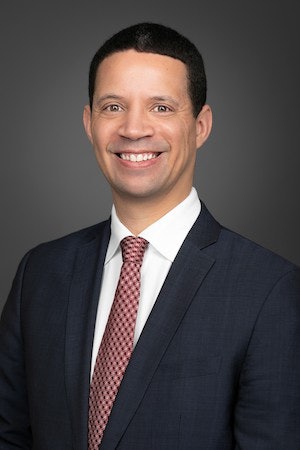Growing up in a mixed-race household, Dr. Nathan Carter knows what it’s like to have hard conversations about race. With White friends, he faced stereotypes about what it meant to be Black. With Black friends, he heard assumptions about what it meant to be White.
“It forced me to really navigate,” Carter said. “How do I engage with this person? I see value in building a relationship here with this individual, but their understanding of race or culture or who I am doesn’t speak to my experience, and what do I do about that?”
 Dr. Nathan Carter
Dr. Nathan CarterNow Carter brings those years of engaging across difference to his new role as Northern Virginia Community College’s first chief diversity, equity and inclusion officer.
The college’s president, Dr. Anne M. Kress praised his “significant academic, research and work experience.”
“His passion and leadership will support NOVA in providing equity in opportunity for our students and a welcoming and inclusive learning and working environment for the full diversity of our community,” Kress said in a statement.
Carter earned his Ph.D. in intercultural communication at Howard University, a master’s degree in communication studies from California State University, Northridge and a bachelor’s degree from the University of the Pacific.
He was formerly the interim associate dean of social sciences for Northern Virginia Community College’s Alexandria campus and served as a research analyst under the superintendent of public instruction at the Virginia Department of Education before joining the college in fall 2012.
As a communication studies scholar, Carter foresees his research informing his diversity, equity and inclusion work. His scholarship focuses on culturally responsive pedagogies, the intersection of communication and racial identity as well as communication within Black communities, among other topics.
He finds a background in communications studies to be useful, especially when it comes to working on inclusion issues centered around language, like gender pronouns.
“The words and the meanings of those words, they’re in people, not the words themselves,” he said. “The connotative meanings of those words, they’re in the individuals, the cultures, the societies that are using them … On the ground, that’s exactly what’s happening with the development of slang, in the development of the renegotiation of what a term really means and understanding the importance of what gender pronouns are about.”
But his research isn’t the only part of his academic journey that inspires him in his new role. He’s also the product of a community college, Sacramento City College.
That experience “really paved the way for me,” Carter said. “That was it really. I’ve done different things in my career, had different opportunities, but I always wanted to come back to a community college to teach. And I always really wanted to do everything that I could to try to make a difference for those students who may find themselves in the situation that I was in at that young age. I felt called to the position more than anything else.”
One of his key goals for this year is to collaborate with the campus community on developing a strategic plan, which will create the “institutional willpower” for the college to set – and meet – clear diversity, equity and inclusion goals based on data.
And for staff and faculty, Carter wants to create “equity grants” to encourage them to run with their own ideas for diversity initiatives with funding from the college.
He also hopes to focus on giving students more opportunities to engage with their identities through extracurriculars on campus – and showing them how to do it as a part of their educational experience.
“I think so many of our economically disadvantaged students, they don’t come with that sense of the college knowledge, particularly at a community college,” he said. “We would expect that they walk into our college and just know how to engage the culture: How do I find my student group? What if I want to create a student group to engage in these issues that I care about that are a part of my identity?”
He finds they often don’t know how to get involved. So, just as community colleges offer clear “academic pathways,” he wants to see Northern Virginia Community College offer clear “DEI pathways” for students to meaningfully engage with each other about identity using the campus resources available.
Going forward, Carter expressed excitement about collaborating with the rest of the campus community in this work. But he’s also looking forward to engaging with those who don’t yet think it’s important.
“It’s not just about finding those who are completely onboard with diversity, equity and inclusion – and what it means to make that a priority – and to surround yourself just with those,” he said. “No, we need to reach out to those who are not as engaged for whichever reason and understand what that is about.
“There’s a space in this world for everyone to be doing this work, but there are a lot of assumptions about what goes along with it. I really look forward to that as well as a part as this process, to reach out to those who are not committed … and just have those conversations too.”
Sara Weissman can be reached at [email protected].
Editor’s Note: Dr. Nathan Carter served as a a research analyst under the superintendent of public instruction at the Virginia Department of Education, not as the superintendent as the article originally stated.



















